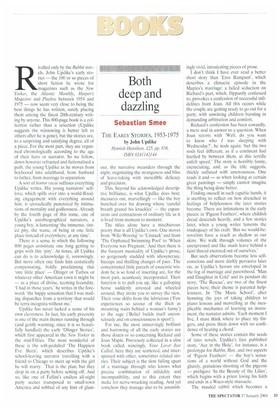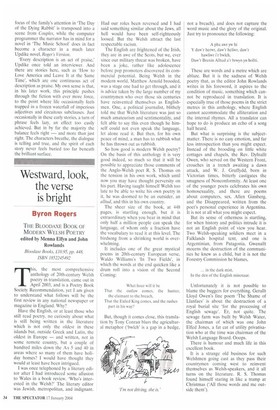Both deep and dazzling
Sebastian Smee
THE EARLY STORIES, 1953-1975 by John Updike Ha mish Hamilton, £25, pp. 838, ISBN 0241142144 Rivalled only by the Rabbit novels, John Updike's early stories — the 100 or so pieces of short fiction he wrote for magazines such as the New Yorker, the Atlantic Monthly, Harper's Magazine and Playboy between 1954 and 1975 — now seem very close to being the best things he has written, surely placing them among the finest 20th-century writing by anyone. This 800-page book is a collection rather than a selection (Updike suggests the winnowing is better left to others after he is gone), but the stories are, to a surprising and satisfying degree, all of a piece. For the most part, they are organised chronologically according to the age of their hero or narrator. So we follow, down however refracted and fictionalised a path, the young Updike as he moves from boyh000d into adulthood, from husband to father, from marriage to separation.
A sort of horror vacui suffuses everything Updike writes. His young narrators' selflove, which spills over into a world-flooding engagement with everything around him, is sporadically punctured by intimations of mortality and godlessness. Already by the fourth page of this tome, one of Updike's autobiographical narrators, a young boy, is lamenting 'the immense, tinted pity, the waste, of being in one little place instead of everywhere, at any time'.
There is a sense in which the following 800 pages constitute one long getting to grips with this 'pity'. At times, all Updike can do is to acknowledge it, sorrowingly. But more often one finds him ecstatically compensating, boldly proclaiming that 'one little place' — Olinger or Tarbox or whatever other American town it might be — as a place of divine, teeming fecundity. 'I had in those years,' he writes in the foreword, 'the happy sensation that I was mailing dispatches from a territory that would be terra incognita without me.'
Updike has never lacked a sense of his own cleverness. In fact, his early precocity is one of the main themes running through (and gently warming, since it is so beautifully handled) the early 'Olinger Stories', which first appeared in the New Yorker in the mid-Fifties, The most wonderful of these is the soft-pedalled 'The Happiest I've Been', which describes Updike's school-leaving narrator travelling with a friend to Chicago to meet up with the girl he will marry. That is the plan; but they drop in on a party before setting off. And so, like one of Fellini's endless all-night party scenes transposed to small-town America and robbed of any hint of glam our, the narrative meanders through the night, negotiating the strangeness and bliss of leave-taking with incredible delicacy and precision.
This, beyond his acknowledged descriptive brilliance, is what Updike does best: measures out, marvellingly — like the boy hunched over his drawing whose 'careful breath grazed his knuckles' — the expansions and contractions of ordinary life as it is lived from moment to moment.
The titles alone have a mischievous poetry that is all Updike's own. One moves from 'Wife-Wooing' to 'Unstuck' and from The Orphaned Swimming Pool' to 'When Everyone was Pregnant.' And then there is the buoyant musicality of Updike's prose, so gorgeously studded with idiosyncrasy, hiccups and thrilling changes of pace. The concentrated little parcels of essayistic dom he is so fond of inserting are, for the most part, seamlessly incorporated. Their function is to pull you up, like a galloping horse suddenly arrested and wheeled around; they invite you to survey the view. Their tone shifts from the lubricious (`Few experiences so savour of the illicit as mounting stairs behind a woman's fanny') to the sage (Belief builds itself unconsciously and on consciousness is spent').
For me, the most unnervingly brilliant and harrowing of all the early stories are those dozen or so concerning Richard and Joan Maple. Previously collected in a slim book called, wincingly, Your Lover Just Called, here they are scattered, and interspersed with other, sometimes related stories. Their subject is the slow falling apart of a marriage through who knows what precise combination of infidelity and incompatibility, and to this extent they make for nerve-wracking reading. And yet somehow they manage also to be astonish
ingly vivid, intoxicating pieces of prose.
I don't think I have ever read a better short story than 'Eros Rampant', which describes a climactic episode in the Maples's marriage: a failed seduction on Richard's part, which, flippantly confessed to, provokes a confession of successful infidelities from Joan. All this occurs while the couple are getting ready to go out for a party, with unwitting children bursting in demanding arbitration and comfort.
Richard's confession has been cowardly, a mere nod in answer to a question. When Joan retorts with 'Well, do you want to know who I was sleeping with Wednesday?', he nods again: 'but the two nods feel different, as if a continent had hurtled by between them, at this terrific unfelt speed.' The story is horribly funny, excruciating, and, as the title suggests, thickly suffused with amorousness. One reads it and — as when looking at certain great paintings — simply cannot imagine the thing being done better.
Finding oneself in such capable hands, it is startling to reflect on how drenched in feelings of helplessness the later stories become. There are intimations in the early pieces: in 'Pigeon Feathers', where childish dread descends heavily, and a few stories later, when a young writer laments the inadequacy of his craft: 'But we would-benovelists have a reach as shallow as our skins. We walk through volumes of the unexpressed and like snails leave behind a faint thread excreted out of ourselves.'
But such observations become less selfconscious and more darkly pervasive later on, as Updike's heroes are enveloped in the fog of marriage and parenthood. 'Man and Daughter in Cold' and its pendant ski story, The Rescue', are two of the finest pieces here; their theme is parental helplessness. In 'The Music School', after hymning the joys of taking children to piano lessons and marvelling at the inexplicable mechanics of learning an instrument, the narrator admits, 'Each moment I live, I must think where to place my fingers, and press them down with no confidence of hearing a chord.'
Some of these stories contain the seeds of later novels. Updike's first published story, 'Ace in the Hole', for instance, is a prototype for Rabbit, Run, and two aspects of 'Pigeon Feathers' — the boy's sensations of a world without God and the ghastly, gratuitous shooting of the pigeons — prefigure 'In the Beauty of the Lilies', which begins with a priest losing his faith and ends in a Waco-style massacre.
The mauled rabbit which becomes a
focus of the family's attention in 'The Day of the Dying Rabbit' is transposed into a scene from Couples, while the computer programmer the narrator has in mind for a novel in 'The Music School' does in fact become a character in a much later Updike novel, Roger's Version. 'Every description is an act of praise,' Updike once told an interviewer. And there are stories here, such as 'How to Love America and Leave It at the Same Time', which are one continuous act of description as praise. My own sense is that, in his later work, this principle pushes through the fiction with ever more force, to the point where life occasionally feels trapped in a frozen waterfall of imperious adjectives and circuitous subclauses. Just occasionally in these early stories, a turn of phrase feels lazy, an effect too easily achieved. But in by far the majority the balance feels right -and more than just right. The characters breathe, the dialogue is telling and true, and the spirit of each story never feels buried too far beneath the brilliant surface.



































































 Previous page
Previous page